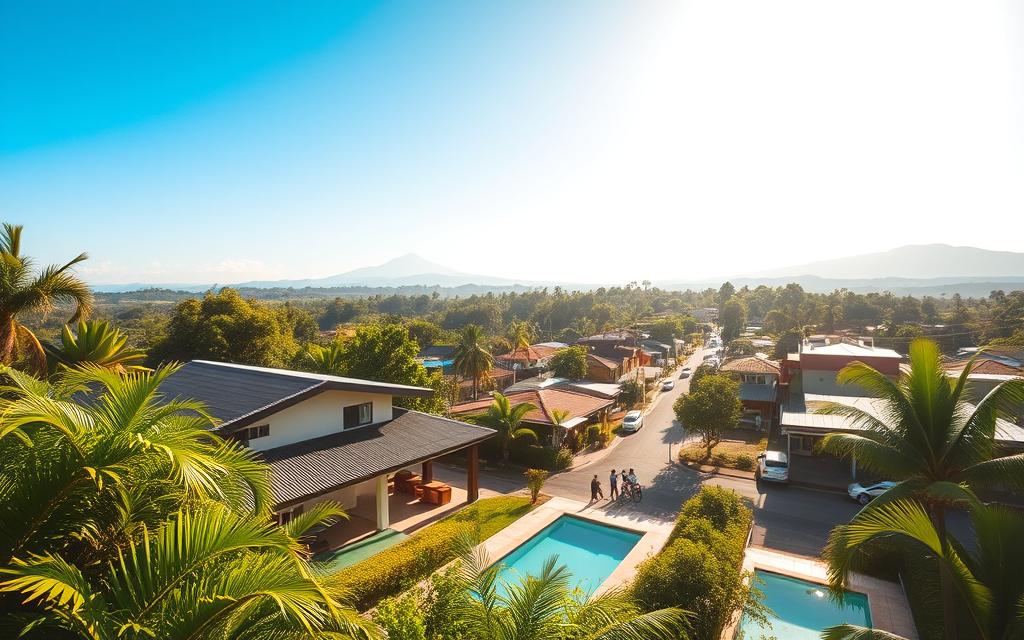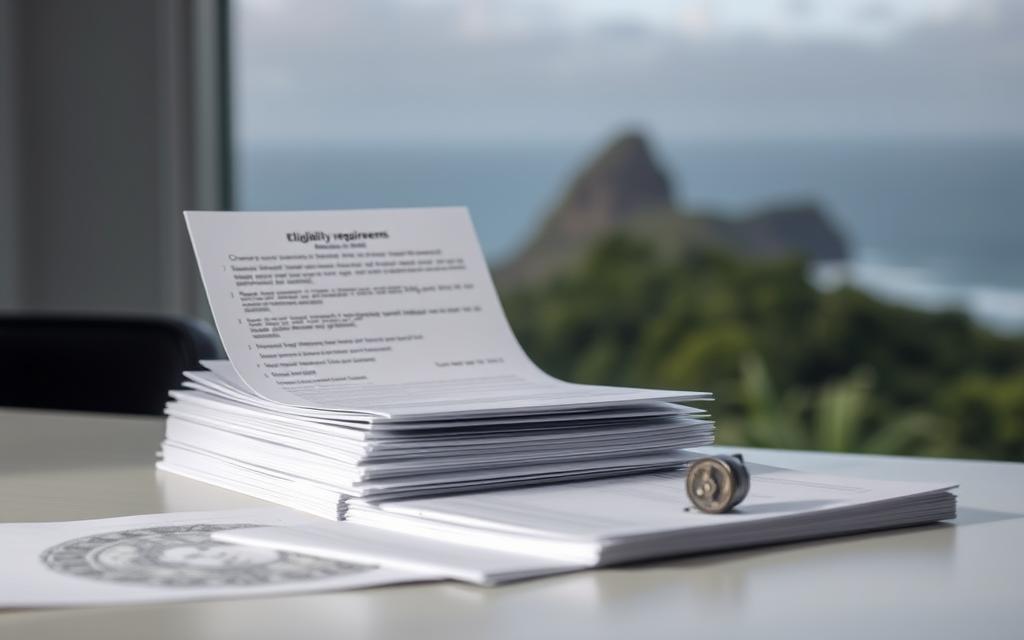Costa Rica Residency

Did you know that over 250 foreign companies have established operations in Costa Rica? This Central American gem has become a hotspot for businesses and individuals seeking long-term opportunities. Its natural beauty, mild climate, and rich culture make it an attractive destination for those exploring residency options.
For businesses, sponsoring employees for residency can be a strategic move. Costa Rica offers various pathways, including rentista, investment, and permanent tracks. Each option caters to different needs, ensuring flexibility for both individuals and companies.
Understanding the immigration process is crucial. From work permits to visa requirements, navigating the system requires careful planning. This guide aims to simplify the sponsorship process, providing clarity for businesses and individuals alike.
Whether you’re a professional seeking a new home or a company expanding operations, Costa Rica’s residency programs offer promising opportunities. Let’s explore the steps and benefits in detail.
Introduction to Costa Rica Residency

The appeal of Costa Rica lies in its natural beauty and welcoming culture. This Central American country has become a top destination for those seeking a better quality of life. Its lush landscapes, mild climate, and vibrant communities make it an ideal place to call home.
For many, obtaining residency in Costa Rica opens doors to new opportunities. The process is designed to be accessible, with various options tailored to different needs. Temporary residency permits are a popular choice, offering flexibility for those exploring long-term stays.
Costa Rican immigration laws emphasize simplicity and efficiency. Applicants must provide essential documents, such as proof of income and a clean criminal record. These requirements ensure a smooth transition for newcomers.
Whether you’re drawn to the country’s rich culture or its serene environment, Costa Rica offers a range of residency options. Our guide will help you navigate the key steps and requirements, making the process straightforward and stress-free.
Understanding the Benefits of Living in Costa Rica

Living in Costa Rica offers a unique blend of natural beauty and cultural richness. The country is known for its high quality of life, making it a top choice for expats seeking a better lifestyle. From lush rainforests to pristine beaches, the environment is both breathtaking and serene.
Quality of Life and Cultural Richness
Costa Rica’s welcoming communities and vibrant culture create an ideal environment for residents. The relaxed pace of life reduces stress, allowing families and professionals to thrive. Local traditions and sustainable living practices further enhance the experience.
Residents enjoy access to excellent healthcare and education systems. Public schools offer free education for children of permanent residents, while subsidized university programs are available for adults. These benefits make Costa Rica a family-friendly destination.
Natural Beauty and Mild Climate
The country’s diverse landscapes, from mountains to coastlines, provide endless opportunities for exploration. The mild climate ensures comfortable living year-round, making outdoor activities a daily pleasure. Whether hiking in national parks or relaxing on the beach, the natural beauty is unmatched.
For those considering residency in Costa Rica, the lifestyle benefits are clear. The combination of cultural vibrancy and environmental assets creates a fulfilling and enriching experience. Stay tuned as we explore the various residency options available.
Types of Residency Options in Costa Rica

Costa Rica offers diverse residency options tailored to different lifestyles and goals. Whether you’re seeking a temporary stay or permanent relocation, the country’s immigration system provides flexibility. Understanding these categories helps in making informed decisions that align with your financial and personal circumstances.
Rentista, Investment, and Permanent Options
The Rentista visa is ideal for individuals with steady unearned income. Applicants must prove a monthly income of at least $2,500 for two years or deposit $60,000 in a Costa Rican bank. This option suits those who rely on passive income sources.
For business-minded individuals, the Investment visa requires a minimum investment of $150,000 in real estate, shares, or national projects. This category is perfect for entrepreneurs looking to contribute to the local economy while securing residency.
Permanent Residency is available after maintaining temporary residency for at least three years. This option grants similar rights as Costa Rican citizens, including employment opportunities. It’s a long-term solution for those committed to settling in the country.
Choosing the Right Category for Your Needs
Selecting the appropriate residency category depends on your financial stability and long-term plans. The Rentista visa is suitable for retirees or those with passive income, while the Investment visa caters to business investors. Permanent Residency is ideal for individuals seeking full integration into Costa Rican society.
Processing times and required documentation vary by category. Applicants must provide proof of income, a clean criminal record, and other essential documents. For detailed guidance, refer to the legal requirements for residency in Costa.
Each residency option impacts work opportunities differently. Temporary permits may not automatically grant work rights, while Permanent Residency offers broader employment privileges. Understanding these nuances ensures a smooth transition to life in Costa Rica.
Eligibility Requirements and Documentation

Securing residency in Costa Rica requires meeting specific financial and legal criteria. These requirements ensure that applicants can support themselves and comply with local laws. Proper preparation and understanding of the process can make the application smoother and more efficient.
Financial Stability and Income Proof
Financial stability is a key requirement for residency applications. Applicants must demonstrate a steady income to support their stay. For example, the Rentista visa requires proof of a monthly income of at least $2,500 or a deposit of $60,000 in a local bank.
Other categories, like the Pensionado visa, require a guaranteed monthly pension of $1,000. These financial proofs ensure that residents can sustain themselves without relying on local resources. Proper documentation of income sources is essential for approval.
Essential Legal and Translated Documents
Legal documents play a crucial role in the residency process. Applicants must provide birth certificates, marriage certificates, and a clean criminal record. These documents must be translated into Spanish and legalized to meet local standards.
Adhering to these requirements avoids delays or rejections. For detailed guidance, refer to our guide on how to get residency in Costa. Proper documentation ensures a seamless transition to life in this beautiful country.
Can I Sponsor an Employee for Costa Rica Residency?

Businesses expanding into Costa Rica often wonder about the possibility of supporting their workforce through residency sponsorship. The answer is yes, but it requires adherence to specific legal and immigration policies. Understanding these rules ensures a smooth process for both employers and employees.
Sponsoring an employee involves meeting certain criteria set by Costa Rican immigration laws. Employers must demonstrate the ability to support the worker financially and ensure compliance with local regulations. This includes providing proof of income and covering living expenses during the employee’s stay.
There are distinct differences between individual and corporate sponsorship. Companies often have access to streamlined processes, especially if they are accredited entities. This can expedite applications and reduce administrative burdens.
Sponsors also bear responsibilities, such as ensuring the employee’s legal status and adherence to work permit requirements. Compliance with national immigration laws is crucial to avoid penalties or delays. For detailed guidance, consult legal experts in Costa Rica.
By understanding the legal framework and meeting key criteria, businesses can successfully sponsor employees for residency. This not only supports workforce stability but also contributes to the local economy.
Steps to Sponsor an Employee in Costa Rica
Navigating the sponsorship process in Costa Rica involves clear steps and proper documentation. Companies must ensure they meet all legal requirements to support their workforce effectively. This guide outlines the essential procedures to simplify the journey.
Gathering and Organizing Required Documents
The first step is collecting all necessary paperwork. This includes proof of income, a clean criminal record, and employment verification. Proper organization ensures a smooth application process.
Documents must be translated into Spanish and legalized. This step is crucial to meet local standards. Missing or incomplete paperwork can delay the process significantly.
Submitting the Application and Follow-Up Process
Once documents are ready, the next step is submitting the application. This involves filing the necessary forms with immigration authorities. Timely submission is key to avoiding delays.
Follow-up is essential to track the status of the application. Regular communication with immigration offices ensures transparency. Preparing request letters and meeting deadlines further streamline the process.
Sponsoring a worker in Costa Rica requires patience and attention to detail. By following these steps, companies can support their workforce effectively. This not only benefits the employee but also contributes to the local economy.
Corporate Sponsorship Processes in Costa Rica
Corporate sponsorship in Costa Rica offers businesses a streamlined pathway to support their workforce. Companies with accredited status enjoy significant advantages, including faster processing times and reduced paperwork. This system is designed to simplify the sponsorship process, making it easier for employers to bring talent into the country.
Accredited Company Benefits and Fast-Track Processing
Accredited companies in Costa Rica benefit from priority filing and expedited processing. Applications from these businesses are often completed in as little as 30 business days, compared to standard timelines. This fast-track process minimizes delays, allowing companies to onboard employees quickly.
To become accredited, businesses must meet specific criteria set by immigration authorities. This includes demonstrating financial stability and compliance with local laws. Once accredited, companies gain access to streamlined procedures, reducing administrative burdens.
Streamlined Documentation Requirements for Employers
Accreditation also simplifies documentation requirements. Employers no longer need to submit extensive paperwork for each foreign national employee. Instead, they can provide essential documents, such as proof of income and employment verification, in a more efficient manner.
This reduction in paperwork saves time and resources for businesses. It also ensures compliance with immigration laws, avoiding potential penalties. For detailed guidance on the accreditation process, visit our guide on starting a business in Costa Rica.
By leveraging accredited status, companies can enhance their workforce stability and contribute to the local economy. This approach benefits both employers and employees, creating a win-win scenario for all parties involved.
Navigating the Work Permit Application Process
Understanding the work permit process in Costa Rica is essential for a smooth transition. This Central American country offers a streamlined system for foreign nationals seeking employment. However, the application process requires careful preparation and attention to detail.
The “special category” visa is a key option for professionals and skilled workers. This visa allows individuals to work in specific industries, such as technology, healthcare, or education. It’s designed to attract talent and support the local economy.
Understanding the “Special Category” Visa
The “special category” visa is tailored for professionals with specialized skills. Applicants must provide proof of qualifications and a job offer from a Costa Rican employer. This visa is ideal for those contributing to high-demand sectors.
Processing times for this visa typically range from three to eight months. Factors such as document verification and fingerprint registration can affect the timeline. Ensuring all paperwork is complete and accurate is crucial for a successful application.
Timeline and Procedural Considerations
The work permit application process involves several steps. First, applicants must gather essential documents, including a valid passport, proof of employment, and a clean criminal record. These documents must be apostilled or legally translated into Spanish.
Next, the application is submitted to immigration authorities. Follow-up is essential to track the status and address any issues promptly. Missing or incomplete paperwork can lead to delays, so thorough preparation is key.
Potential challenges include document discrepancies or extended processing times. Working with legal experts can help navigate these hurdles efficiently. Proper planning ensures a smooth and stress-free experience.
By understanding the process and meeting all requirements, applicants can secure their work permit with confidence. This opens doors to new opportunities and a fulfilling life in Costa Rica.
Key Considerations for Employers Sponsoring Residency
Employers must prioritize compliance with immigration laws when sponsoring foreign workers. Costa Rica’s legal framework ensures that companies meet specific requirements to support their workforce effectively. Understanding these obligations is crucial for a smooth sponsorship process.
Compliance with Local Immigration Laws
Meeting immigration requirements is a top priority for employers. Costa Rican laws mandate that companies provide proof of financial stability and ensure proper documentation for sponsored workers. This includes verifying employment contracts and covering living expenses during the employee’s stay.
Employers must also update corporate records regularly to maintain legal standing. Non-compliance can lead to penalties, including fines or revoked sponsorship privileges. Staying informed about immigration policies helps avoid these risks.
Consulting with legal experts in Costa Rica ensures adherence to all regulations. Specialists can guide employers through the process, from document preparation to application submission. This professional support minimizes errors and delays.
By prioritizing compliance, companies protect both their interests and their employees’ legal status. This approach fosters trust and stability within the workforce, contributing to long-term success in Costa Rica.
Comparing Temporary and Permanent Residency Options
Choosing between temporary and permanent residency in Costa Rica depends on your long-term goals. Both options offer unique benefits, but understanding their differences is crucial for making an informed decision.
Temporary residency is ideal for those exploring life in Costa Rica without a long-term commitment. This type of residence permit typically lasts one to two years and can be renewed. It’s perfect for individuals or families testing the waters before making a permanent move.
Permanent residency, on the other hand, is designed for those ready to settle in Costa Rica. After holding temporary residency for three years, individuals can apply for permanent status. This option provides stability and access to benefits like public healthcare and education.
Processing times and documentation requirements vary between the two options. Temporary residency applications often take three to six months, while permanent residency can take up to a year. Both require proof of income, a clean criminal record, and translated legal documents.
For employers, temporary residency may be more suitable for short-term projects, while permanent residency supports long-term workforce stability. Each pathway has its own renewal process and associated fees, so planning ahead is essential.
By evaluating your goals and understanding the criteria, you can select the residency type that best suits your needs. Whether temporary or permanent, Costa Rica offers a welcoming environment for newcomers.
Additional Tips for a Smooth Application Process
Streamlining the residency application process in Costa Rica requires careful planning and expert guidance. By following a few practical steps, applicants can reduce delays and ensure a seamless experience. Proper preparation is essential to navigate the system efficiently.
Working with Legal Specialists and Immigration Experts
Collaborating with experienced legal specialists can significantly enhance the efficiency of your application. Professionals familiar with Costa Rica’s immigration laws can provide tailored advice and ensure all documents meet local requirements. This support minimizes errors and speeds up processing times.
Proactive follow-up is another key factor. Regularly checking the status of your application helps address any issues promptly. Proper fee management, including timely payments in USD, also prevents unnecessary delays.
Document Verification and Timely Submissions
Accurate document preparation is crucial. Ensure your passport, employment letter, and other essential paperwork are up-to-date and properly translated. Missing or incomplete documents can lead to extended processing times, often taking several months to resolve.
Submitting your application on time is equally important. Delays in filing can push back approval timelines, affecting your ability to work or reside in the country. Monitoring progress and staying organized ensures a smooth process.
For additional support, consider consulting legal firms specializing in residency applications. Their expertise can help you avoid common pitfalls and achieve your goals efficiently.
Conclusion
Costa Rica’s residency programs provide a gateway to a vibrant lifestyle and business opportunities. Whether seeking permanent residency or temporary permits, the country offers diverse options tailored to individual and corporate needs. From its stunning natural beauty to its welcoming culture, Costa Rica remains a top choice for those looking to relocate or expand operations.
Understanding the types of residency options and the sponsorship process is crucial. Compliance with immigration laws and proper documentation ensures a smooth application experience. Both individuals and companies benefit from clearly navigating the system, leading to long-term success and stability.
Residency in Costa Rica enhances quality of life and supports business growth. For personalized assistance, consulting legal experts is highly recommended. Their guidance ensures adherence to regulations and maximizes the benefits of living and working in this remarkable country.


